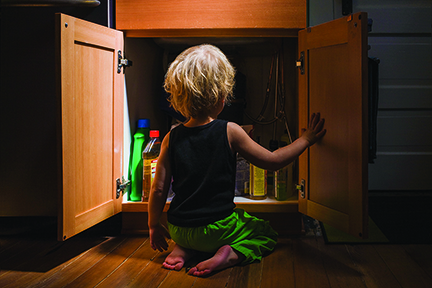
By FORT POLK SAFETY OFFICE
FORT POLK, La. — National Poison Prevention Week is the perfect time to poison proof your home and protect loved ones. Poisons are everywhere and can affect anyone, anywhere at any time of life.
Protect yourself and others from being poisoned by learning what a poison is, who is at risk, and how to prevent a poisoning from happening.
What is a poison?
A poison is anything that can harm someone if it is used in the wrong way, by the wrong person or in the wrong amount. Some poisons may be harmful if they come into direct contact with your eyes or skin. Others may be toxic if you breathe them or swallow them. Poisons can come in four forms: Solids (such as pain medicine pills or tablets), liquids (such as household cleaners, including bleach), sprays (such as spray cleaners) and gases (such as carbon monoxide).
Who is at risk?
You may think poisoning affects only a certain group of people — such as young children or older adults. This, however, is not true. Anyone, regardless of their age, race, ethnicity or career, can be poisoned. According to the Health Resources and Services Administration, in 2008, 2.5 million people called a poison center because someone had been exposed to a poison. Children under age 6 accounted for half of all human poison exposures reported to poison centers. However, adults are also at risk. That year, more than three-quarters of all poisoning deaths reported to poison centers occurred among people ages 20 to 59.
What are the risks throughout life?
Certain kinds of poisonings are common among specific age groups. For example, older adults specifically need to be aware of the poisoning risks involved with taking prescription medications. Children are commonly poisoned through painkillers, cosmetics, personal care or cleaning products, pest killers and plants. Preteens through older adults are commonly poisoned through herbal products, prescription drugs, alcohol, over-the-counter medicines and spoiled food.
People of all ages may be stung by a bee, splashed with a chemical or exposed to carbon monoxide in their homes.
What can you do?
• Do not panic. Not all medicines, chemicals or household products are poisonous. Not all contact with poison results in poisoning. Follow the advice you receive from your poison center.
Some additional first steps include:
• If the person inhaled poison, get to fresh air right away. If the person has poison on the skin, take off any clothing the poison touched. Rinse skin with running water for 15 to 20 minutes. If the person has poison in the eyes, rinse eyes with running water for 15 to 20 minutes. Poison proof your home.
More than 90 percent of the time, poisonings happen in people’s homes. The majority of these poisonings occur in the kitchen, bathroom and bedroom.
That is why it is important to follow simple steps to prevent a poisoning from happening at home. Teach your family to never touch or put anything in their mouths unless they know what it is.
Carbon monoxide
• Have a working carbon monoxide detector in your home. The best places for a CO detector are near bedrooms and close to furnaces.
Household products
• Keep products in their original containers. Do not use food containers (such as cups or bottles) to store household cleaners and other chemicals or products. Keep all laundry products locked up, high, and out of the reach of children.
Chemicals
• Keep antifreeze and all chemicals and household products in their original containers.
Back to school/art supplies
• Some art products are mixtures of chemicals. They can be dangerous if not used correctly. Make sure children use art products safely by reading and following directions. Do not eat or drink while using art products. Wash skin after contact with art products. Clean equipment. Wipe tables, desks and counters. Keep art products in their original containers.
Food
• Wash hands and counters before preparing all food. Store food at the proper temperatures. Refrigerated foods should not be left out at temperatures above 40 degrees F (5 degrees C). Use clean utensils for cooking and serving.
Animals/insects
• Know what poisonous snakes live in your area and wear proper attire when hiking outdoors.
• Check the label on any insect repellent. Be aware that most contain DEET, which can be poisonous in large quantities.
Find more information and useful tips and tools at https://poisonhelp.hrsa.gov/.




